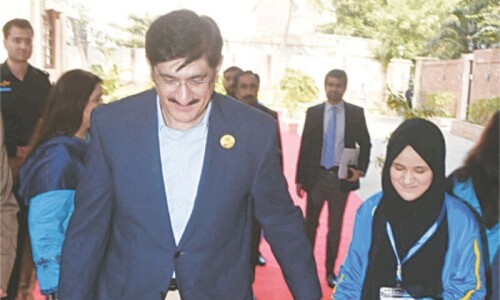KARACHI, May 17: Following the repeated emergence of polio cases in Sindh in the first four months of the year, the provincial health department has declared it will establish a task-force to plan for, monitor and evaluate the coming national and sub-national immunisation campaigns against polio across the province.
Speaking at a media briefing here after his meeting with representatives of the World Health Organisation (WHO) and Unicef on Saturday, provincial Minister for Health Dr Saghir Ahmed said that Sindh had reported eight polio cases since January this year as against 12 last year, which was certainly an alarming situation as far as services related to polio eradication in the province were concerned.
He pointed out the reservations of donor agencies and NGOs working in the health sector and national experts on child health and said: “Despite repeated claims of giving a final push to achieve polio eradication in Sindh, the quarters concerned have been unable to make it.”
He said though he was a new minister in the health sector, he understood that there had been some loopholes in the management of the supplementary vaccination campaigns and there was a lack of coordination and collaboration between different departments and wings of the governments at the local, provincial and national levels, which now needed to be addressed on a war footing.
However, the minister avoided setting any exact deadline for the end of polio in the province.
He said he would try to get proper management and a system of checks and balances and monitoring of the system on a campaign to campaign basis in order to improve the campaign coverage rates and ensure a system of accountability. He said the situation was grave and needed to be sorted out with honesty, commitment and transparency.
“Reporting of cases will not be hidden by any of the health officials in future and the Sindh governor, chief minister, nazims, EDOs and all stakeholders would be taken on board towards the cause of reducing the number of cases in the province,” he added.
During the year, Sindh has reported one case each in Hyderabad, Karachi, Nawabshah, Mirpurkhas, Dadu, Shikarpur, Jacobabad and Naushehro Feroze districts. One third of the polio-infected districts have seen re-introduction of the dreaded virus after an interval of more than a year.
Elaborating on the decisions reached at Saturday’s meeting, Dr Ahmed said that micro-plans prepared in regard to oral polio vaccines’ (OPVs) administration, reports of executive district officers (health), monitoring aspects and financing and technical support made or needed would be properly evaluated and efforts would be made to address the issues hindering access of field workers to children under five.
“Among various measures, we will go for an improvement in the quality of water consumed by children across the province, reduction of gastroenteritis and diarrhoea incidences in children and ensuring the efficacy of vaccines till a time when those are delivered to children at their doorsteps,” he added, saying that as part of social mobilization, the government would also seek the support of religious scholars and other opinion makers in the context of enhancement of acceptability of OPVs both in the urban and rural areas.
He pointed out that his department would also examine suggestions pertaining to linking of immunization cards with admissions to primary classes. “We will also encourage the government health officials reporting emergence of polio cases in their jurisdictions at the first instance,” he said.
‘Success is remarkable’
The senior polio adviser to the regional director of WHO, Dr M.H. Wahdan, said that success in the context of polio eradication in Pakistan and Sindh had been remarkable in terms of statistics during the year and he could say that if Sindh got two or three good quality campaigns, without leaving out any area, polio would be eradicated from Pakistan in very little time.
“Besides highlighting the activities of special polio immunization campaigns, the media should also help create the culture of mandatory routine immunization against vaccine-preventable diseases in children in their primary age. You must make the parents feel that routine vaccinations are the right of their children and protect them from various diseases, including polio,” he added, saying that vaccines given to the children of Sindh – like other provinces of the country and parts of the world – were very much effective and no once should doubt their effectiveness.
Replying to a question, Dr Wahdan said people in many countries of the world rush for routine immunization vaccines, which was missing in Pakistan, otherwise children here too would not need special vaccination campaigns. “Pakistan needs to improve the quality and capacity of its vaccinators,” he noted.
WHO representative in Pakistan Dr Khalif Bile Mohamud, said that special immunization activities like that of polio vaccinations were considered a parallel way to increase immunity in children but unfortunately, due to some loopholes in the implementation stages, both of the schemes could not be purposefully exploited.
National Programme Manager on EPI Dr Hussain Bux Memon, Director of Provincial EPI Dr Mazhar Khamisani, representatives from Unicef, the provincial health department and other organisations were also present at the briefing.














































Dear visitor, the comments section is undergoing an overhaul and will return soon.